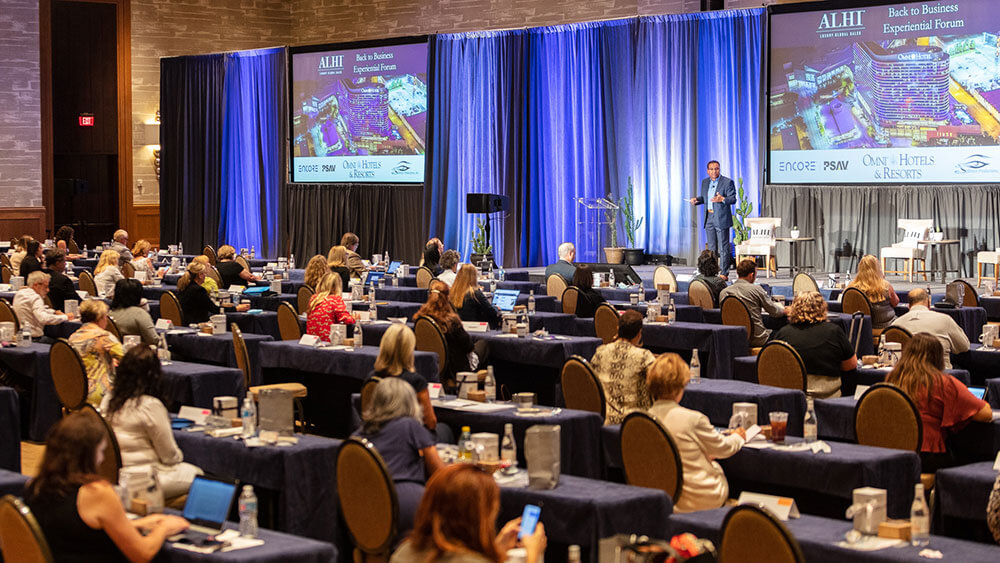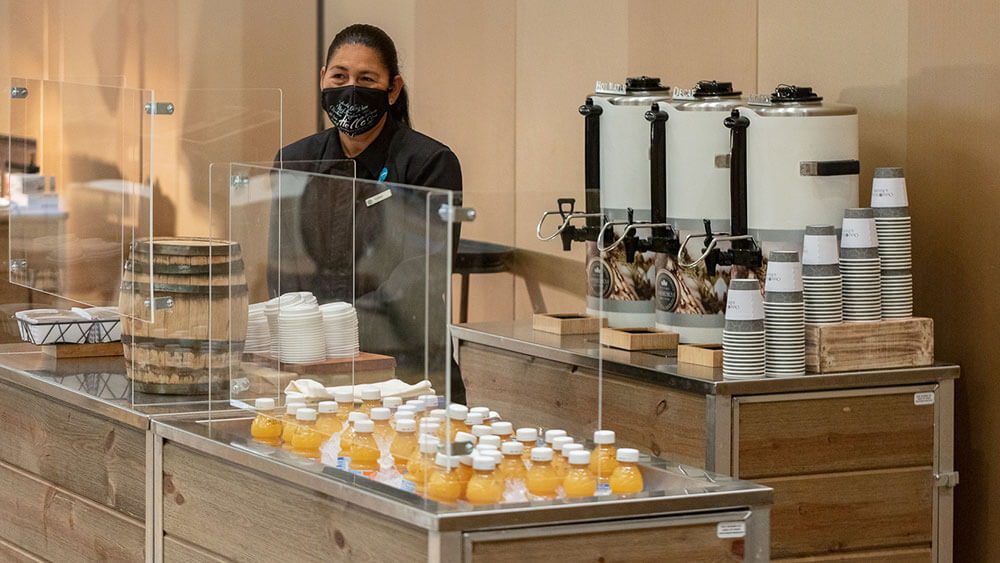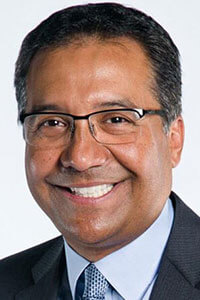
ALHI hosted the Back to Business Experiential Forum at the Omni Dallas to show off how its safety guidelines work in a mid-pandemic world. (Clint Brewer)
In May, Associated Luxury Hotels International (ALHI) released its ALHI Back to Business Travel Safety Guidelines — a regularly updated set of safety measures for ALHI’s member hotels, as well as airlines, airports, and other organizations involved with the travel experience. While the guidelines serve as an important resource, “our planning community is so visual,” Michael Dominguez, ALHI’s president and CEO, said. “They really wanted to see it.”
The organization had been hosting regular, well-attended client engagement calls throughout the COVID-19 crisis and wanted a way to show this community how to put on an event following CDC guidelines. “About eight to 10 weeks ago, you could feel there was a real need as we were starting to talk about opening and what that could look like and how we move forward,” Dominguez said.
On Aug.18-19, ALHI hosted the Back to Business Experiential Forum, a free, face-to-face, omnichannel event at one of its member hotels, Omni Dallas, to show off how its guidelines work in a mid-pandemic world and how omnichannel events can make everyone feel included. The in-person aspect of the event was kept small at just 125 attendees, who were hosted overnight at the Omni Dallas if necessary, with approximately 500 attendees tuning in online as well. Attendees, who were responsible for their own travel expenses, included ALHI meeting professionals who participated in the regular COVID-19 calls — a mix of corporate, association, and third-party planners — as well as ALHI member hoteliers.
“We had speakers broadcast in that could interact with us in the [live] audience,” Dominguez said of the omnichannel aspect of the event, “and [we had] polling that was the same online and in the room, which made sure [everyone] was engaged.” The event essentially featured two runs, he said — all attendees participated together in general sessions, but content was different beyond that.
“Notes were flying through the chats and Q&A — people saying, ‘Wow, it would be great to really see the breaks and what they’re doing,’” Dominguez said, so an event producer walked around with a camera and microphone showing the room sets. “These are opportunities that I think are presented today,” Dominguez said.

For coffee breaks, the Omni Dallas created a coffee bar that included transmission barriers and an employee getting attendees’ drinks. (Clint Brewer)
Live and In-Person
The “physical side” of social distancing was easy enough to figure out, Dominguez said — chairs can easily be spaced six feet apart in a meeting room. Other logistics of a physical event, however, have been previously taken for granted or were of little concern — such as how attendees can get coffee during breaks or how a roomful of people can be let out at the end of a session without causing bottlenecks — were critical to ALHI demonstrating the kind of planning necessary to host a safe in-person event today, he said.
“It is now about communication and as I like to say, un-training 20 years of habits that we all have. That is really probably the biggest piece of it,” Dominguez said. “It was a collaboration between our team and the Omni team to make sure that we had thought all of those pieces out.”
To prepare attendees for new ways of behaving at events, ALHI held a pre-con phone call sharing what those coming to the in-person event could expect. “It was the rules of engagement, and even how we entered and exited a room during any break,” Dominguez said. It was also a time for ALHI to establish what the organization expected from its attendees, including wearing masks whenever physical distancing could not be maintained.
“We utilize the code of conduct that’s been released with the APEX Recovery Task Force,” Dominguez said, which was issued to participants ahead of time. The code of conduct was also at registration, reminding attendees of safe social-distancing practices. “I think that’s a big piece in moving forward right now — it is very, very much a shared responsibility that we have to communicate.”

Michael Dominguez
During the event, attendees were released by rows of tables when moving from one room to another, such as from breakfast to the main meeting room. “Not everybody was going to the general session room at one time and that’s a shift for people, but I think it’s important in today’s environment,” Dominguez said. “You’re trying to limit mass movement as much as possible.”
To demonstrate how they can further handle traffic flow at their physical meetings, attendees were assigned to four concurrent breakout rooms. But instead of the attendees moving between rooms, “we rotated the speakers,” Dominguez said. “It was one of the biggest ‘aha’ moments for the planners who were in the room.… It’s understanding traffic flow and how you’re going to control that — that really takes a little bit of thought and coordination.”
ALHI relied on the Omni Dallas’ F&B expertise to help coordinate safe food and coffee breaks. The hotel mixed self-service and one-on-one interaction with staff to create a positive experience. For example, lunch was served in the main session room to lessen movement of attendees, and they remained at their own six-foot table to eat. Everyone was served a Caesar salad in a large, enclosed mason jar, “which means it was already served closed and protected,” Dominguez said. “You literally shook the salad, dumped it over [a plate], and you were able to serve it to yourself,” he said.
For coffee breaks, the Omni created a coffee bar that looks similar to a traditional bar but also included transmission barriers necessary to ensure the employees were protected, Dominguez said. Attendees went up one-by-one to the coffee station, quickly ordered their coffee, and stepped aside as soon as they were served, allowing the employees serving the coffee to reset the machine in a matter of seconds. “It’s easier to manage flow when you’re serving coffee versus people trying to get their own,” Dominguez said.
“When we were doing our calls, one of the planners actually said, ‘Well, [serving coffee] is really going to slow down the process,’” Dominguez said. “I go, ‘How? You can only pour one cup of coffee at a time.’ It is perception, it’s not reality.”
Dominguez said that while the Back to Business Experiential Forum showed how events can safely be held in person during the COVID-19 pandemic, he acknowledged that not everyone is ready to get back to business in the same way.
“We were showing people how it can be done for those who are ready to meet and those who are ready to travel. If you’re not, you’re not,” he said. For those who are ready, Dominguez said, the event showed them “a path forward.”
Casey Gale is associate editor at Convene.
